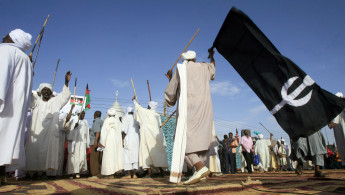Mahdi arrest spawns rival theories
The arrest on Saturday of al-Sadeq al-Mahdi, head of the Sudanese opposition National Umma Party (NUP), has come as a surprise to many, with rival theories competing to explain the motivation behind his detention.
Mahdi was arrested after criticising the Rapid Support Forces (RSF) – known locally as the Janjaweed – a government-sponsored paramilitary force operating in western Sudan and eastern Chad. Mahdi said the force had carried out war crimes including rape and looting in the Darfur region, which has been denied by RSF commanders.
The Sudanese National Intelligence and Security Services (NISS), officially in control of the RSF, filed a complaint against Mahdi and he was arrested.
He is held on charges that include endangering domestic stability and threatening the constitution. He could yet face the death penalty.
The bigger picture
| Mahdi has accused “the regime’s hawks” of being behind his arrest |
The day after his arrest, the NISS announced it was mobilising three RSF brigades - some 3,000 armed men – on high alert around Khartoum. Extra police forces have also been deployed.
But the NISS denied rumours that the bolstering of troops was ordered to prevent any coup attempts, and stressed that there was no danger to national stability.
Mahdi has been known to espouse “soft opposition” to the regime, to the extent that he has been accused by some opposition figures of being in league with the ruling party as part of its agenda to break up the opposition. These critics point to the fact that his son, Abdul Rahman, was appointed assistant to Sudanese President Omar al-Bashir.
With the NISS appearing to impose itself directly on the political scene, particularly by reinforcing the role of the controversial RSF, questions have been raised about the readiness of the security apparatus to accept the results of the national dialogue process called for by Bashir.
Some opposition forces have recently called for greater limits on the mandate of the NISS. They want to see curbs on its intelligence collation, a reduction in its increasingly political role, and a curtailment of its ability to escalate tension between Mahdi and the government.
Damaging attempts at dialogue
There has been much speculation about the reasons why the government has changed its position towards Mahdi. It is unclear why it brought criminal charges against him while his opposition al-Ummah party strongly supports dialogue and peaceful change that would not exclude the ruling party. Furthermore, Mahdi is vocally opposed to any use of force against the regime and considers a popular uprising to be “a last resort”.
Somebelieve that what happened was agreed with Mahdi in advance in an attempt to make him look better in the eyes of anti-establishment trends on the street, and to undermine more hard-line opposition groups, in particular the People’s Congress Party, led by Mahdi’s rival Hassan al-Turabi. Others see such a conspiracy as unlikely in view of the distress detention would likely cause Mahdi.
This is Mahdi’s third spell in Kober prison in the past 25 years.
He was first imprisoned for five months in June 1989, one week after the current regime seized power and removed Mahdi, then elected prime minister, through a coup d’ etat. After his release, he was placed under house arrest for five years until 1994, dur
| The NISS denied rumours that the deployment of troops was ordered to prevent any coup attempts |
ing which time his movements were supervised. He was arrested again in 1995, this time for 101 days, before going into exile for five years.
Splitting Sudan
This time, his arrest has divided the ruling National Congress Party (NCP) with some worrying it will hasten the demise of a national dialogue process – the success of which the government has taken a number of steps to ensure.
The confrontation with Mahdi was escalated by elements among the security establishment and in the NCP opposed to national dialogue, al-Tayeb Zein al-Abideen, a professor of politics at the University of Khartoum, told al-Araby al-Jadeed. The NISS, he added, had no interest in talks to eliminate many of the country’s political tensions ending with success.
The government did not care about the consequences of its actions, Abideen said, and he suggested that attempts at dialogue would fail as long as the NISS was in charge of the RSF. The decision to arrest Mahdi, he noted, had taken place during a visit to Sudan by African Union mediator Thabo Mbeki, the former South African president.
But Mahdi’s criticism of the NISS’ paramilitaries had undermined attempts to shore up Sudanese stability, said Bashir Rahmah, secretary of foreign relations for the opposition People’s Congress Party. By arresting him, he said, the NISS had shown that they were ready to sacrifice dialogue for security, especially when talks got to the subject of President Bashir.
“The security services were not interested in the dialogue, as political issues were their last priority,” Rahmah said. He also added that the ultimate decision for Mahdi’s arrest was made by Bashir himself. No one, he said, was arrested without the Sudanese president’s consent.
Mahdi himself has accused “the regime’s hawks” of being behind his arrest in their bid to damage the national dialogue process. In response to reporters’ questions, Mahdi also said the government had not expected him personally to direct criticism against its forces, because he enjoyed high credibility inside and outside the country.



